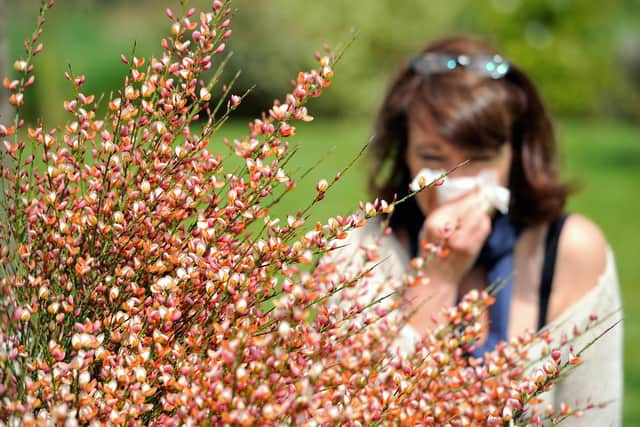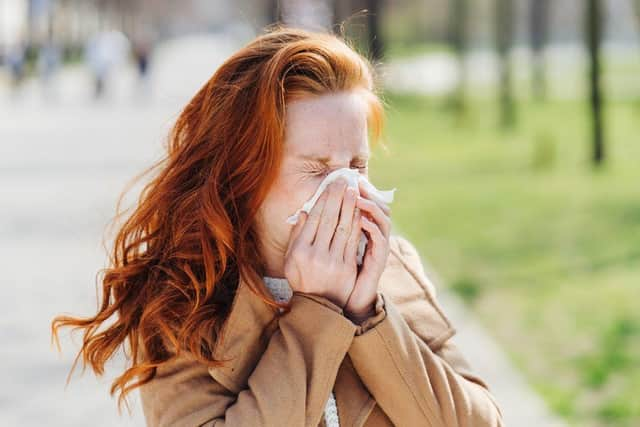Alleviate hayfever: List of hayfever do’s and don’ts & best antihistamines to use according to Boots
This article contains affiliate links. We may earn a small commission on items purchased through this article, but that does not affect our editorial judgement.
If you suffer from hayfever, it’s this time of year you might notice the first sudden surge of symptoms as the first ‘pollen bomb’ of the year hits. The Met Office has issued a red ‘high alert’ to warn those with allergies to be cautious this weekend as pollen levels are high.
The NHS website states hayfever is usually worse between late March and September, especially when it’s warm, humid and windy. According to the Met Office the high levels this week are coming from tree pollen including birch, hornbeam, willow and ash. As well as fungal spores, Aspergillus Penicillium and Pleospora, which are in peak season.
Advertisement
Hide AdAdvertisement
Hide AdTo help those who suffer from hay fever, we have rounded up the best antihistamines to use according to reviews on the Boots website, as well as a list of how to alleviate your symptoms.
Most of the UK has been issued with the high-level pollen alert, including the East Midlands, East of England, London and the South East, Wales, South West and West Midlands. There is also a ‘very high’ alert in some parts on Easter Sunday (April 9).
How to stop hay fever - do’s and don’ts
There’s currently no cure for hay fever and you cannot prevent it. However, you can do these things to mitigate symptoms.
- put Vaseline around your nostrils to trap pollen
- wear wraparound sunglasses to stop pollen from getting into your eyes
- shower and change your clothes after you have been outside to wash pollen off
- stay indoors whenever possible
- keep windows and doors shut as much as possible
- vacuum regularly and dust with a damp cloth
- buy a pollen filter for the air vents in your car and a vacuum cleaner with a HEPA filter
- try to stay at home and avoid contact with other people if you have a high temperature or you do not feel well enough to do your normal activities


Hayfever - what not to do
- do not cut grass or walk on grass
- do not spend too much time outside
- do not keep fresh flowers in the house
- do not smoke or be around smoke – it makes your symptoms worse
- do not dry clothes outside – they can catch pollen
- do not let pets in and out of the house if possible – they can carry pollen indoors
Best antihistamines to use according to Boots Reviews
The NHS website says antihistamines are medicines often used to relieve symptoms of allergies, such as hay fever, hives, conjunctivitis and reactions to insect bites or stings. Here we have rounded up the best antihistamines to use according to reviews on the Boots website.
Clarityn Allergy 10mg Tablets - £5.99
Advertisement
Hide AdAdvertisement
Hide AdThis product received the best reviews on the Boots website. As many as 236 hayfever suffers rated the product with an average score of 4.7 stars. One person said: “I’ve purchased this product a few times now to help ease my allergies. Fast acting and does exactly what it says on the label.”
Clarityn Allergy Syrup Sugar-Free Mixed Berries Flavour 60ml - £5.55
Clarityn Syrup can relieve a variety of allergies like those caused by pets and dust, as well as hayfever and skin allergies like rashes, itching and hives. More than 100 reviewers left positive feedback for this product.
Benadryl Allergy One-a-day 10mg - £10.49
Benadryl One a Day Relief offers daily relief from the symptoms of hay fever and other allergic conditions such as pet, skin and dust allergies. This product has received 99 five-star reviews.


Benadryl Allergy Relief - £9.99
Advertisement
Hide AdAdvertisement
Hide AdThis product claims to be active in 15 minutes on skin allergies and lasts eight hours. It works to relieve the symptoms of hay fever and other allergic conditions such as pet, skin or dust allergies.
Otrivine Natural Daily Nasal Wash - £9.25
The Boots website says Otrivine Natural Daily Nasal Wash is for application in the nose to gently clean the nasal cavities when blocked, such as during a cold or in allergic conditions, by washing away the impurities, excess mucus, or the allergen particles such as dust and pollen.
The Met Office website says around two in every ten people suffer from pollen allergies and it is thought more than 10 million people in Britain suffer from hay fever. You are more likely to suffer from hay fever if you have a family history of allergies, or if you suffer from asthma or eczema.
Comment Guidelines
National World encourages reader discussion on our stories. User feedback, insights and back-and-forth exchanges add a rich layer of context to reporting. Please review our Community Guidelines before commenting.
